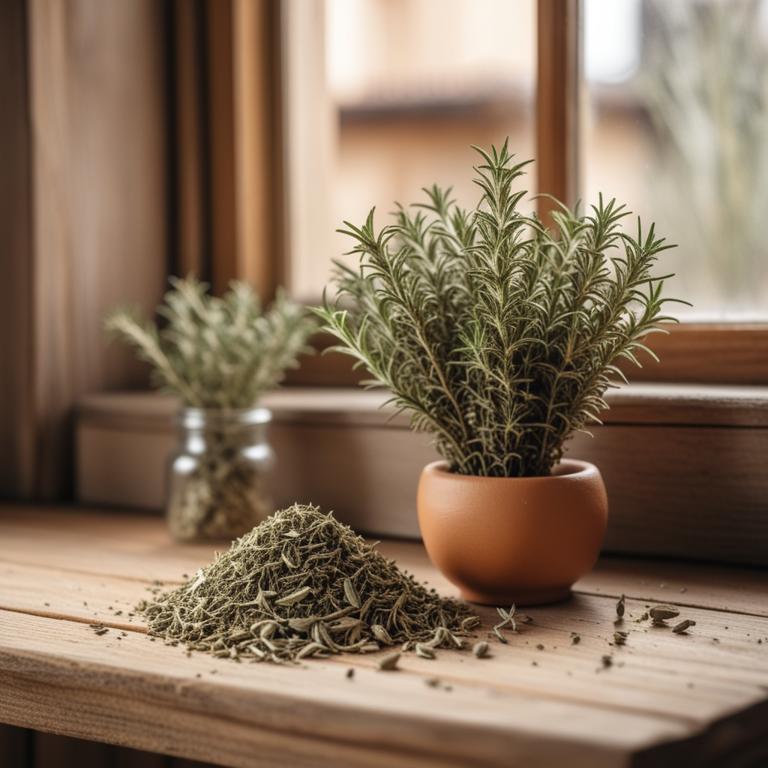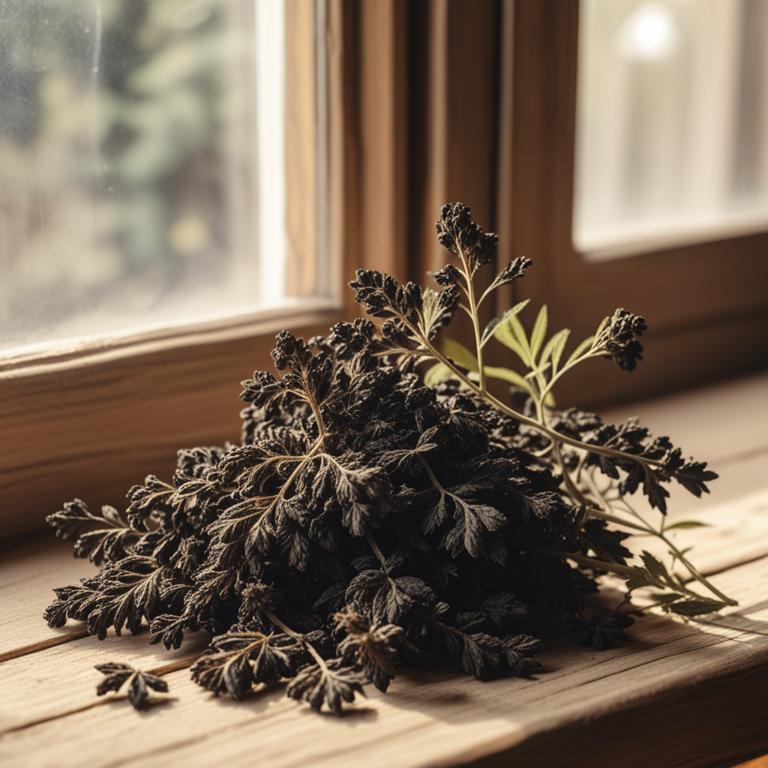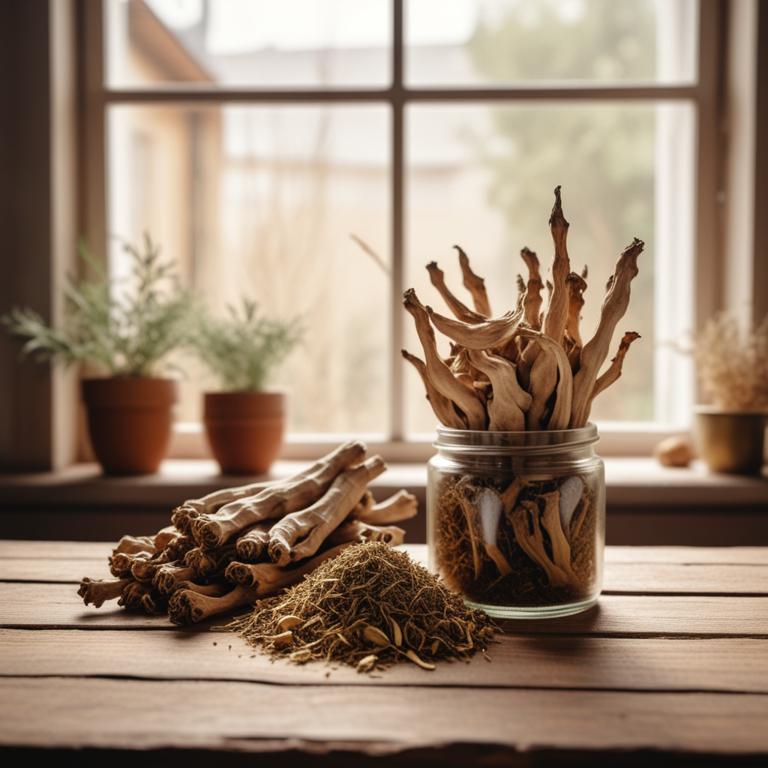Updated: Dec 1, 2024
Snoring: Causes, Herbal Remedies, and a Good Night's Sleep

Snoring is a common issue where a person makes loud noises while sleeping due to partially blocked airways.
It can disrupt sleep quality, affecting not just the snorer but also their partner, leading to fatigue, irritability, and other health problems. Snoring is often caused by factors like obesity, nasal congestion, smoking, and sleeping on one's back. Some people may be more prone to snoring due to their anatomy, such as having a larger tongue or softer palate. Certain medications and health conditions, like sleep apnea, can also contribute to snoring. Herbal remedies can help alleviate snoring.
Some of these herbs have natural decongestant properties, which can help open up the airways. Peppermint, for example, is known for its ability to ease congestion and promote relaxation. Ginger and eucalyptus are other herbs that can help ease breathing and reduce inflammation. To use these herbs for snoring, you can try drinking teas made from these herbs. Simply steep the herbs in hot water, let it cool, and drink it before bedtime. Some people also use essential oils like peppermint and eucalyptus in a diffuser to promote relaxation and ease congestion.
Another option is to take capsules or tinctures of these herbs, but it's always best to consult with a healthcare professional before trying any new remedies.
Table of Contents
What leads to snoring in most cases?
The main causes of snoring are complex and can vary from person to person.
However, there are four common causes that contribute to snoring. Obesity is one of the main causes of snoring. When a person is overweight or obese, the excess fat in the throat area can cause the airway to narrow, leading to vibrations that produce the snoring sound. This is because the fat tissues in the throat can cause the airway to become restricted, making it harder for air to pass through, resulting in the characteristic snoring sound. Another major cause of snoring is Sleep Apnea. This is a serious medical condition where a person stops breathing for short periods while they are asleep. When a person with sleep apnea breathes in, the air can cause their airway to vibrate, resulting in snoring.
There are two types of sleep apnea: obstructive and central. Obstructive sleep apnea is the most common type and is caused by a blockage in the airway, while central sleep apnea is caused by a problem with the brain's ability to control breathing. Sleep position is another significant cause of snoring. When a person sleeps on their back, their tongue and soft palate can fall back and cause the airway to narrow, leading to vibrations and snoring. This is why many people who snore are recommended to sleep on their side. Lastly, nasal deformity can also cause snoring. When a person has a deviated septum or other nasal abnormalities, it can cause the air to be directed through the mouth rather than the nose, leading to snoring.
This is because the mouth is a smaller airway than the nose, causing the air to vibrate and produce the snoring sound.
What are the benefits of employing herbs to alleviate snoring?
Using herbs to help with snoring has several benefits.
These natural remedies can help to reduce inflammation in the airways, which can contribute to snoring. By calming the airways and reducing swelling, herbs can make it easier to breathe, which can lead to quieter sleep and better rest.
Some herbs also have a decongestant effect, which can help to clear out mucus and other blockages that can cause snoring. This can be especially helpful for people who snore due to allergies or a cold. Additionally, certain herbs have a calming effect on the body, which can help to reduce stress and anxiety that can contribute to snoring.
By promoting relaxation and reducing inflammation, these herbs can help to improve sleep quality and reduce the frequency and severity of snoring episodes.
What are the main medicinal herbs known to alleviate snoring?

Herbs have been used for centuries to help with snoring, and they're worth considering.
Valeriana officinalis, or valerian root, is a natural relaxant that calms the nervous system, which can help reduce snoring caused by tension and stress. When you're relaxed, your airways are less likely to narrow, which can help you breathe more smoothly. Zingiber officinale, or ginger, has anti-inflammatory properties that can help reduce swelling in the nasal passages, making it easier to breathe.
Echinacea purpurea, or coneflower, has been shown to have a decongestant effect, helping to clear out mucus and other debris that can block airways. Passiflora incarnata, or passionflower, is another natural relaxant that can help calm the nervous system and promote better sleep. This can be especially helpful for people who snore because they're not getting enough quality sleep. Melissa officinalis, or lemon balm, has a soothing effect on the muscles in the throat, which can help reduce snoring caused by inflammation and irritation.
By using these herbs, you may be able to reduce your snoring and improve your overall breathing.
What herbal preparations are commonly employed to combat snoring?

Herbal preparations can help with snoring because they often target the underlying causes, such as inflammation and congestion.
One way to use herbs is by making tea from dried flowers, leaves, or roots. For example, chamomile tea is calming and can help relax the muscles in the throat, reducing snoring. Another option is a decoction, which is made by simmering herbs in water to release their active compounds. Ginger decoction can help reduce inflammation in the nasal passages and sinuses, making it easier to breathe.
An infusion is similar to tea, but it's made by steeping herbs in hot water for a shorter time. Peppermint infusion can help clear mucus and ease congestion, making it easier to breathe and reducing snoring. Herbal tinctures are concentrated liquid extracts that can be added to water or taken directly. Throat Coat tincture, for example, combines slippery elm and other herbs to soothe and protect the mucous membranes in the throat. A salve, made by infusing herbs in a carrier oil, can be applied topically to reduce inflammation and congestion.
Eucalyptus salve can be applied to the chest and nose to help loosen mucus and ease breathing.
Additional Resources:
What herbs should be avoided if you have snoring?
If you have snoring problems, it's best to steer clear of certain herbs that can make things worse.
Ginkgo biloba, for instance, can cause your airways to constrict, which can make snoring more severe. This is because it can affect the way your blood vessels work, making it harder for air to flow freely through your airways.
Pausinystalia johimbe is another herb to watch out for, as it can stimulate your nervous system to the point of causing irregular heartbeats, which can increase the likelihood of snoring. Similarly, Ephedra sinica can cause your heart rate and blood pressure to spike, which can make snoring more frequent and intense. Glycyrrhiza glabra can cause your body to retain water, leading to swelling in your throat and nasal passages, which can contribute to snoring.
And lastly, Cannabis sativa can cause your body to relax too much, leading to a more open throat and nasal passages, but also to a more relaxed airway, which can cause the airway muscles to become flaccid and vibrate more, resulting in snoring.
FAQ
Are there any specific herbs that can prevent snoring?
Some herbs that may help reduce snoring are peppermint and eucalyptus.
They have natural decongestant properties that can open airways, making breathing easier. Ginger is another herb that might help, as it's known for its anti-inflammatory properties, which can reduce swelling in the nasal passages and sinuses.
This can lead to quieter nights.
Is it safe to use herbal remedies for snoring during pregnancy?
During pregnancy, it's best to be cautious with herbal remedies for snoring.
Some herbs like valerian root and chamomile might help calm the body, but others could have unknown effects on the unborn baby.
If you choose to try herbal remedies, start with small amounts and monitor your body's response carefully.
Are there any herbs that can reduce the frequency of snoring?
Some herbs may help reduce snoring frequency.
Thyme and eucalyptus have natural decongestant properties that can help ease congestion in the nasal passages, making it easier to breathe. These herbs can also reduce inflammation and swelling in the throat, which can cause snoring.
Drinking tea made from these herbs may help alleviate snoring symptoms.
Related Articles

Chest Congestion: Understanding the Causes and Herbal Solutions

Causes, Medicinal Herbs, and Herbal Remedies for Shortness of Breath

Cold Relief: Causes, Medicinal Herbs, and Herbal Remedies

Emphysema Causes, Symptoms, and Herbal Relief Options

Pertussis: Causes, Symptoms, and Natural Remedies with Medicinal Herbs






